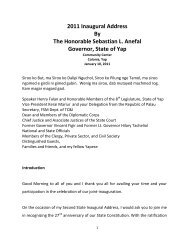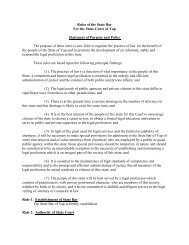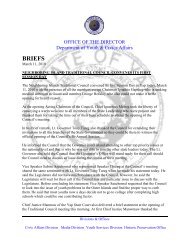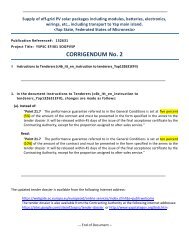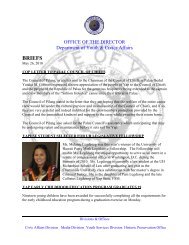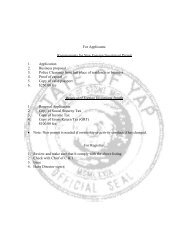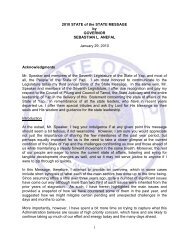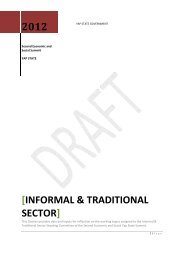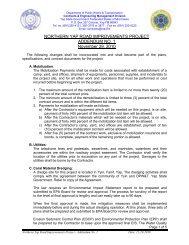RULES OF CIVIL PROCEDURE For the Trial Division of the Yap ...
RULES OF CIVIL PROCEDURE For the Trial Division of the Yap ...
RULES OF CIVIL PROCEDURE For the Trial Division of the Yap ...
You also want an ePaper? Increase the reach of your titles
YUMPU automatically turns print PDFs into web optimized ePapers that Google loves.
proceedings in <strong>the</strong> <strong>Trial</strong> <strong>Division</strong>. In such case <strong>the</strong> party who desires to perpetuate <strong>the</strong><br />
testimony may make a motion in <strong>the</strong> <strong>Trial</strong> <strong>Division</strong> for leave to take <strong>the</strong> depositions, upon<br />
<strong>the</strong> same notice and service <strong>the</strong>re<strong>of</strong> as if <strong>the</strong> action was pending in <strong>the</strong> <strong>Trial</strong> <strong>Division</strong>. The<br />
motion shall show (1) <strong>the</strong> names and addresses <strong>of</strong> persons to be examined and <strong>the</strong><br />
substance <strong>of</strong> <strong>the</strong> testimony which he expects to elicit from each; (2) <strong>the</strong> reasons for<br />
perpetuating <strong>the</strong>ir testimony. If <strong>the</strong> court finds that <strong>the</strong> perpetuation <strong>of</strong> <strong>the</strong> testimony is<br />
proper to avoid a failure or delay <strong>of</strong> justice, it may make an order allowing <strong>the</strong><br />
depositions to be taken and may make orders <strong>of</strong> <strong>the</strong> character provided for by Rules 34<br />
and 35, and <strong>the</strong>reupon (cf. #9 <strong>of</strong> comments).<br />
(c) Perpetuation by Action. This rule does not limit <strong>the</strong> power <strong>of</strong> a court to entertain<br />
an action to perpetuate testimony.<br />
Rule 28. Persons Before Whom Depositions May be Taken.<br />
(a) Within <strong>the</strong> State <strong>of</strong> <strong>Yap</strong> and <strong>the</strong> rest <strong>of</strong> <strong>the</strong> Federated States <strong>of</strong> Micronesia.<br />
Within <strong>the</strong> State <strong>of</strong> <strong>Yap</strong> and <strong>the</strong> rest <strong>of</strong> <strong>the</strong> Federated States <strong>of</strong> Micronesia depositions<br />
shall be taken before an <strong>of</strong>ficer authorized to administer oaths by <strong>the</strong> laws <strong>of</strong> <strong>Yap</strong> or <strong>of</strong><br />
<strong>the</strong> state where <strong>the</strong> examination is held, or before a person appointed by <strong>the</strong> court in<br />
which <strong>the</strong> action is pending. A person so appointed has power to administer oaths and<br />
take testimony. The term <strong>of</strong>ficer as used in Rule 30, 31, and 32 includes a person<br />
appointed by <strong>the</strong> court or designated by <strong>the</strong> parties under Rule 29.<br />
(b) In <strong>For</strong>eign Countries. In a foreign country, depositions may be taken (1) on<br />
notice before a person authorized to administer oaths in <strong>the</strong> place in which <strong>the</strong><br />
examination is held, ei<strong>the</strong>r by <strong>the</strong> law <strong>the</strong>re<strong>of</strong> or by <strong>the</strong> law <strong>of</strong> <strong>the</strong> State <strong>of</strong> <strong>Yap</strong> or (2)<br />
before a person commissioned by <strong>the</strong> court, and a person so commissioned shall have <strong>the</strong><br />
power by virtue <strong>of</strong> his commission to administer any necessary oath and take testimony,<br />
or (3) pursuant to a letter rogatory. A commission or a letter rogatory shall be issued on<br />
application and notice and on terms that are just and appropriate. It is not requisite to <strong>the</strong><br />
issuance <strong>of</strong> a commission or a letter rogatory that <strong>the</strong> taking <strong>of</strong> <strong>the</strong> deposition in any o<strong>the</strong>r<br />
manner is impracticable or inconvenient; and both a commission and a letter rogatory<br />
may be issued in proper cases. A notice or commission may designate <strong>the</strong> person before<br />
whom <strong>the</strong> deposition is to be taken ei<strong>the</strong>r by name or descriptive title. A letter rogatory<br />
may be addressed "To <strong>the</strong> Appropriate Authority in (here name <strong>the</strong> country)". Evidence<br />
obtained in response to a letter rogatory need not be excluded merely for <strong>the</strong> reason that it<br />
is not a verbatim transcript or that <strong>the</strong> testimony was not taken under oath or for any<br />
similar departure from <strong>the</strong> requirements for depositions taken within <strong>the</strong> State <strong>of</strong> <strong>Yap</strong><br />
under <strong>the</strong>se rules.<br />
(c) Disqualification for Interest. No deposition shall be taken before a person who is<br />
a relative or employee or attorney or trial counselor <strong>of</strong> any <strong>of</strong> <strong>the</strong> parties, or is a relative<br />
or employee <strong>of</strong> such counsel, or is financially interested in <strong>the</strong> action.<br />
Rule 29. Stipulations Regarding Discovery Procedure.<br />
Unless <strong>the</strong> court orders o<strong>the</strong>rwise, <strong>the</strong> parties may by written stipulation (1) provide<br />
that depositions may be taken before any person, at any time or place, upon any notice,



